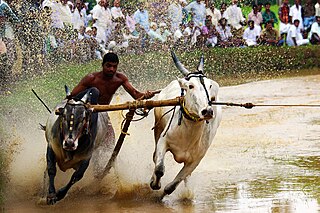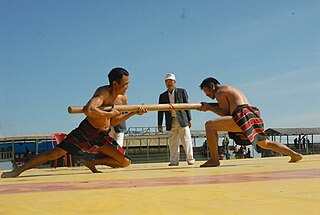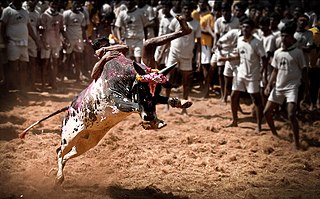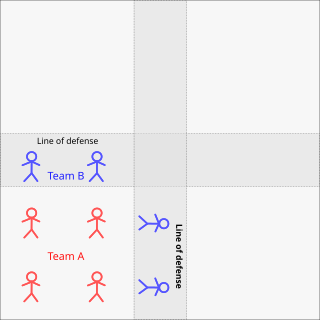 W
WAssamese: অসমৰ পুৰণি খেল-ধেমালিKoni-juj or egg tapping Kori khel Moh juj or buffalo fight Ghora dor or horse riding Dor or running Tarual khel fencing Hen mela or hawk releasing Kaar khel or archery Bulbuli soraai juj or nightingale fight Maal juj or wrestling Bagh-bhaluk juj or tiger-bear fight Ghorial juj or crocodile fight Haati juj or elephant fight Haau khel – lora, dhora, bunda haau Gandh haau Dhoop khel Tanguti Ghila khel Luka-bhaku or hide and seek Dhemona ona khel Laali Furti or gola Hafla Ghila Rosi tona or rope pulling Kodhora tona Kukura juj or cock fight Bhota guti Muthi bhota Mongal potha Haatbol Boitha bol Tinthengia dor Tekeli bhonga Gos kopaati Thati kopaati Fulfuloti Hafula Sul Thukusa Leteku Siloni- siloni Hosoni-bisoni Leskes Haatur or swimming – Siloni or back swimming, Thio haatur or straight swimming Kasuguti – Suloguti, Bais guti or Baagh bool, Pachis guti, dooi guti Kanimuni or blind game Haatha botha or Donda bota Duloni Suwa-sui or touching game Sak ghora bahor theng Sobista bokul guti or sobista tetelir gutir khel Pokha khel or dice Tel diya bah gosot utha climb oily bamboo or tel diya kolgosot utha climb oily banana plant Lathi khel or stick fight Naukhel or boat racing – soranau small boat, pansoinau medium boat, Bornau big boat Hetali Hasiyai Sondali Kukur puwali Khuli khel Kukur thengia Irikoti mirikoti Gos kobadi Hoi kobadi
 W
WBall badminton is a sport native to India. It is a racket game, played with a yellow ball made of wool, on a court of fixed dimensions divided by a net. The game was played as early as 1856 by the royal family in Tanjore, the capital of Thanjavur district in Tamil Nadu, India. It enjoys the greatest popularity in India. Ball badminton is a fast-paced game; it demands skill, quick reflexes, good judgment, agility, and the ability to control the ball with one's wrist.
 W
WPambaram பம்பரம், Pambaram പമ്പരം, Buguriಬುಗುರಿ, Lattu لٹو , Bongaram బొంగరం, Latim লাটিম is a traditional throwing top used mainly in India and Bangladesh. In Telangana and Andhra Pradesh, its name is "Bongaralu Aata". This game can be played by all age group.
 W
WBull surfing is a harvest sport race that take place in the village of Anandapally, southern Kerala during the post harvest season. A pair of yoked bulls are sent charging down a football field-sized paddy field soaked in ankle deep water, while their handlers boarded on a wooden plank, hang onto the tail or onto a harness and slide through the mud. The fields are freshly ploughed as the bulls are raced by their handlers.
 W
WChaturanga, or catur for short, is an ancient Indian strategy game that is commonly theorized to be the common ancestor of the board games chess, xiangqi, shogi, sittuyin, and makruk.
 W
WDhopkhel, also transliterated dhop khel and dhoop khel, is a traditional ball game played in the Indian state of Assam. The game is played between two teams of 11 on a 125 m × 80 m field bounded by four flags. The players take turns throwing the ball at the opponent to knock them out of the game, while seeking to catch the ball and evade other players. It is a test of speed, stamina, and acrobatic skills.
 W
WFighter kites are kites used for the sport of kite fighting. Traditionally most are small, unstable single-line flat kites where line tension alone is used for control, at least part of which is manja, typically glass-coated cotton strands, to cut down the line of others.
 W
WGilli Danda also known as Viti Dandu, Kitti-Pul and by other variations, is a sport originating from the Indian subcontinent, played in the rural areas and small towns all over South Asia as well as Cambodia, Turkey, South Africa, Italy, Poland, and in some Caribbean islands like Cuba. The game is played with two sticks: a large one called a danda , which is used to hit a smaller one, the gilli . Other than using a smaller target stick, rather than a ball, it bears many similarities to bat and ball games such as cricket and baseball.
 W
WHori Habba, also known as Hatti Habba, Kobbari Hori Competition is a rural sport in which hundreds of trained and decorated draught cattle and bulls are made to run through huge crowds Catchers try to subdue the cattle and snatch away prizes such as copra, cash, gift items tied to them. The sports is practiced mainly in Shivamogga, Haveri and Uttara Kannada districts of the Indian state of Karnataka during the Deepavali festival.
 W
WInsuknawr or Rod Pushing Sport is an indigenous game of Mizoram, a state in North-East India.
 W
WJallikattu, also known as eru thazhuvuthal and mañcuvirattu, is a traditional event in which a bull, such as the Pulikulam or Kangayam breeds, is released into a crowd of people, and multiple human participants attempt to grab the large hump on the bull's back with both arms and hang on to it while the bull attempts to escape. Participants hold the hump for as long as possible, attempting to bring the bull to a stop. In some cases, participants must ride long enough to remove flags on the bull's horns.
 W
WKabaddi is a contact team sport. Played between two teams of seven players, the objective of the game is for a single player on offence, referred to as a "raider", to run into the opposing team's half of a court, tag out as many of their defenders as possible, and return to their own half of the court, all without being tackled by the defenders, and in a single breath. Points are scored for each player tagged by the raider, while the opposing team earns a point for stopping the raider. Players are taken out of the game if they are tagged or tackled, but are brought back in for each point scored by their team from a tag or tackle.
 W
WKho Kho is a popular tag game invented in Maharashtra, India. It is played by teams of 12 nominated players out of fifteen, of which nine enter the field who sit on their knees, and 3 extra who try to avoid being touched by members of the opposing team. It is one of the two most popular traditional tag games in the Indian subcontinent, the other being Kabaddi. The sport is widely played across South Asia and has a strong presence in South Africa and England.
 W
WKuttiyum kolum is a traditional game played in Kerala, India. It is similar to an ancient game found all over the Indian Subcontinent with different names, such as Gilli-danda in North India. A similar game by the name of Lippa has been played in Italy. Kuttiyum kolum possibly originated over 2500 years ago.
 W
WLangdi is a traditional Indian field sport played in Pandiyan Dynasty called "Nondiyaattam", similar to hopscotch. It is described by Marathis as a sport with a Marathi ethos.
 W
WMallakhamb is a traditional sport, originating from the Indian subcontinent, in which a gymnast performs aerial yoga or gymnastic postures and wrestling grips in concert with a vertical stationary or hanging wooden pole, cane, or rope. The word Mallakhamb also refers to the pole used in the sport. The pole is usually made from sheesham polished with castor oil. Three popular versions of Mallakhamb are practiced using a sheesham pole, cane, or rope.
 W
WPehlwani, also known as kushti, is a form of wrestling contested in the Indian subcontinent. It was developed from native Indian malla-yuddha. The words pehlwani and kushti derive from the Persian terms pahlavani (heroic) and koshti respectively, meaning Heroic wrestling. It is likely that the word derives from the Iranian word "Pehalavi" denoting to people of Iranian descent.
 W
WPunjabi kabaddi, also called circle style kabaddi, is a contact sport that originated in the Punjab region, in the northern part of the Indian subcontinent. There are a number of traditional Punjabi kabaddi styles traditionally played in the Punjab region. Like standard kabaddi, circle style kabaddi is played at state and international levels, through various governing bodies such as Kabaddi World Cup.
 W
WSeven stones is a game from the Indian subcontinent involving a ball and a pile of flat stones, generally played between two teams in a large outdoor area. It is played today in villages.
 W
WSurr is a sport played in the areas around Ayodhya in northern India.
 W
WTennikoit, also called ring tennis or tenniquoits, is game played on a tennis-style court, with a circular rubber ring hurled over a net separating the two players, with each endeavoring to catch and return the hurled ring into the opponent's court.
 W
WVallam Kali is a traditional boat race in Kerala, India. It is a form of canoe racing, and uses paddled war canoes. It is mainly conducted during the season of the harvest festival Onam in spring. Vallam kali includes races of many kinds of paddled longboats and 'snake boats'. Each team spends about 6 lakh rupees for the Nehru Trophy.